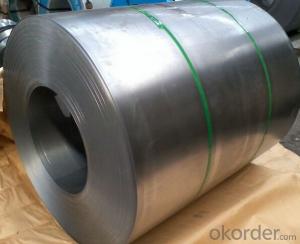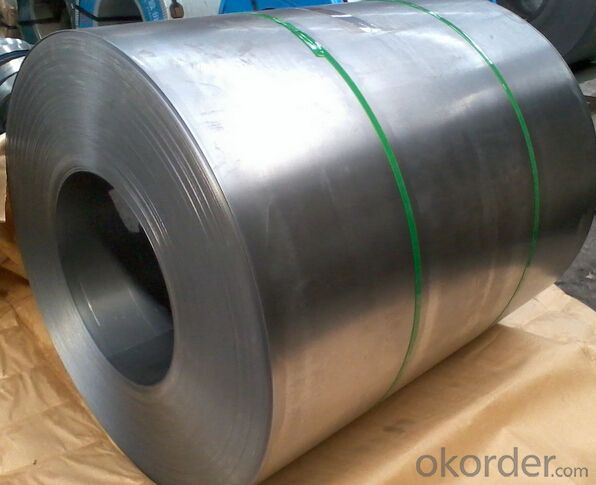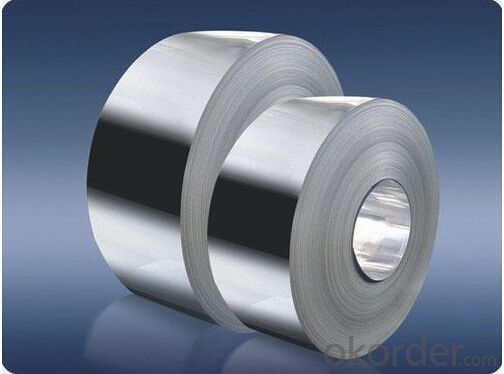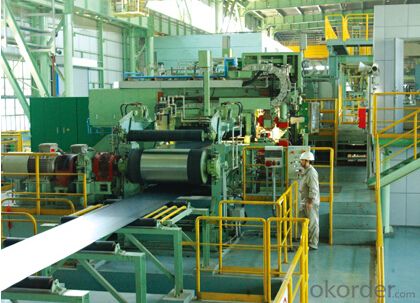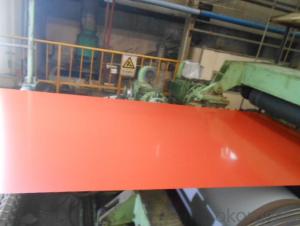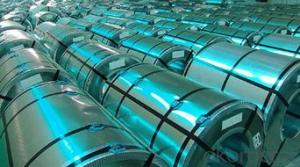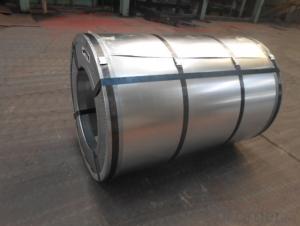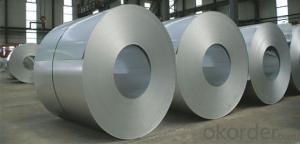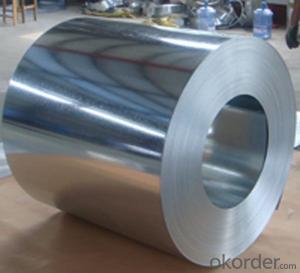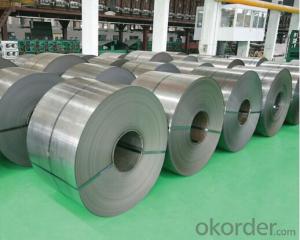Best Quality of Cold Rolled Steel Coil of China
- Loading Port:
- Tianjin
- Payment Terms:
- TT OR LC
- Min Order Qty:
- 100 m.t.
- Supply Capability:
- 100000 m.t./month
OKorder Service Pledge
OKorder Financial Service
You Might Also Like
1.Structure of Cold Rolled Steel Description:
The raw material of cold rolled steel coil/sheet is high quality hot rolled product, and after pickling continuous rolling, degreasing, annealing,skin pass,slitting and cut to length line etc. Along with it many kinds of new technology and new process of global cold rolling production have been applied. Therefore the quality of the goods could be guaranteed. The product is widely used in outdoor and interior decoration, furnishing manufacturing, home appliance, automobile etc.
2.Main Features of the Cold Rolled Steel:
• Excellent process capability
• Smooth and flat surface
• Workability, durability
• Excellent heat resistance performance
• High strength
• Good formability
• Good visual effect
3.Cold Rolled Steel Images
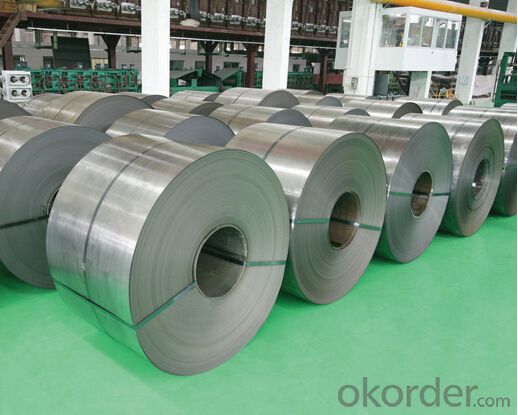
4.Cold Rolled Steel Specification
Standard:AISI,ASTM,DIN,GB,JIS,JIS G3302 ASTM 653M EN10142
Grade: Q195~Q345
Thickness: 0.16mm~1.5mm,0.16-1.5mm
Width: 1250,600-1250mm
Coil weight:3-12 MT
Coil ID:508/610mm
Chemical composition:
C | Si | Mn | Cr | Ni | P | S |
0.150 | 0.476 | 11.231 | 12.50 | 0.900 | 0.039 | 0.010
|
5.FAQ of Cold Rolled Steel
We have organized several common questions for our clients,may help you sincerely:
1.How about your company?
A world class manufacturer & supplier of castings forging in carbon steel and alloy steel,is one of the large-scale professional investment casting production bases in China,consisting of both casting foundry forging and machining factory. Annually more than 8000 tons Precision casting and forging parts are exported to markets in Europe,
2.How to guarantee the quality of the products?
We have established the international advanced quality management system,every link from raw material to final product we have strict quality test;We resolutely put an end to unqualified products flowing into the market. At the same time, we will provide necessary follow-up service assurance.
3. How long can we receive the product after purchase?
Usually within thirty working days after receiving buyer’s advance payment or LC. We will arrange the factory manufacturing as soon as possible. The cargo readiness usually takes 15-25 days, but the shipment will depend on the vessel situation.
- Q: I have a Nike SQ Sumo 21 degree and it is a steel shaft. I hit the ball very high with this club and I lose distance. I don't hit any of my other clubs high it's just this one. Is it because of the steel shaft or is it the club? Help please.
- if you are a good player they say steel shaft is better. more consistent. I prefer graphite its lighter and I can flip my wrists easier.
- Q: What are the common surface treatments for steel coils?
- Common surface treatments for steel coils include galvanizing, which involves applying a layer of zinc to protect against corrosion; painting, where a layer of paint is applied for aesthetic purposes or to provide additional protection; and chromating, which involves applying a thin layer of chromium to enhance corrosion resistance and improve paint adhesion.
- Q: What is the average width tolerance for steel coils?
- The average width tolerance for steel coils can vary depending on the specific industry and application, but typically it ranges from ±0.005 to ±0.25 inches.
- Q: What are the uses of galvanized steel coils?
- Galvanized steel coils are widely used in various industries for their durability and corrosion resistance. They are commonly used in construction for roofing, siding, and structural components. They are also used in the automotive industry for manufacturing parts such as body panels, chassis, and exhaust systems. Additionally, galvanized steel coils find applications in the manufacturing of appliances, agricultural equipment, and electrical enclosures.
- Q: What is future prospect of these steel structures, are they really weather proof like everyone believes??
- Solid Steel Buildings, Inc. is an all encompassing Steel Building Solution provider.? Our methodology will provide you with a low cost steel building with the highest possible quality.
- Q: What are the potential dangers of handling steel coils?
- There are several potential dangers associated with handling steel coils. Firstly, steel coils are heavy and can pose a risk of physical injury if not handled properly. The weight of the coils can cause strains, sprains, or even more serious injuries if dropped or mishandled. This is particularly true when using manual lifting equipment or when attempting to move the coils without proper training or assistance. Secondly, steel coils often have sharp edges or protruding parts that can cause cuts or puncture wounds if not handled with care. These sharp edges can be especially hazardous when attempting to manipulate or position the coils during transportation or storage. It is important to wear appropriate personal protective equipment, such as gloves, to minimize the risk of injury. In addition, steel coils can become unstable if not adequately secured or balanced. Improper stacking or storage of the coils can lead to them shifting or falling, potentially causing serious injuries or damage. It is crucial to follow proper stacking and storage procedures, including using appropriate equipment and supports, to ensure stability and prevent accidents. Furthermore, steel coils are often stored in areas with limited space or uneven surfaces, increasing the risk of trips, falls, or collisions. It is essential to maintain clear and well-organized storage areas, free of obstacles or hazards, to reduce the likelihood of accidents. Lastly, steel coils can be subject to corrosion or rust, which can weaken the metal and compromise their structural integrity. This can increase the risk of the coils collapsing or breaking during handling, potentially causing injuries or damage to property. Regular inspections and maintenance of the coils, as well as proper storage in dry and well-ventilated areas, can help mitigate this risk. Overall, the potential dangers of handling steel coils include physical injuries from their weight and sharp edges, instability during transportation or storage, accidents due to limited space or uneven surfaces, and the risk of structural failure due to corrosion or rust. It is crucial to follow proper safety protocols, receive appropriate training, and use the necessary equipment to minimize these risks and ensure safe handling of steel coils.
- Q: How do steel coils contribute to energy savings in buildings?
- Steel coils contribute to energy savings in buildings in several ways. Firstly, steel coils are often used as part of the insulation system in buildings. The high thermal conductivity of steel allows for efficient heat transfer, ensuring that the building remains well-insulated and energy loss is minimized. Additionally, steel coils are often used for HVAC systems, which play a crucial role in energy efficiency. By using steel coils in these systems, the heat transfer process can be optimized, reducing the energy required to heat or cool the building. Moreover, steel coils are durable and long-lasting, reducing the need for frequent replacements and maintenance, which in turn saves energy and resources. Overall, the use of steel coils in buildings helps to improve energy efficiency and reduce energy consumption, contributing to significant energy savings.
- Q: Can steel coils be coated with thermally insulating materials?
- Yes, steel coils can be coated with thermally insulating materials. These materials help to reduce heat transfer and provide insulation to the steel coils, enhancing their thermal resistance.
- Q: Can steel coils be used in the production of furniture?
- Yes, steel coils can be used in the production of furniture. Steel coils can be used to create sturdy frames for furniture such as chairs and sofas. The coils can be shaped and welded together to provide support and durability to the furniture.
- Q: Its big and expensive and i don't know if it would have a logical purpose but its sharp as hell and awesome. Anyways, its made from surgical steel and all i have found on the internet is that its probably 316L (w/e that means). I have another knife made from 440 stainless steel and as far as i know that is pretty much the hardest stainless metal. So why would the more expensive one be made from surgical steel?
- Unfortunately okorder /
Send your message to us
Best Quality of Cold Rolled Steel Coil of China
- Loading Port:
- Tianjin
- Payment Terms:
- TT OR LC
- Min Order Qty:
- 100 m.t.
- Supply Capability:
- 100000 m.t./month
OKorder Service Pledge
OKorder Financial Service
Similar products
Hot products
Hot Searches
Related keywords
